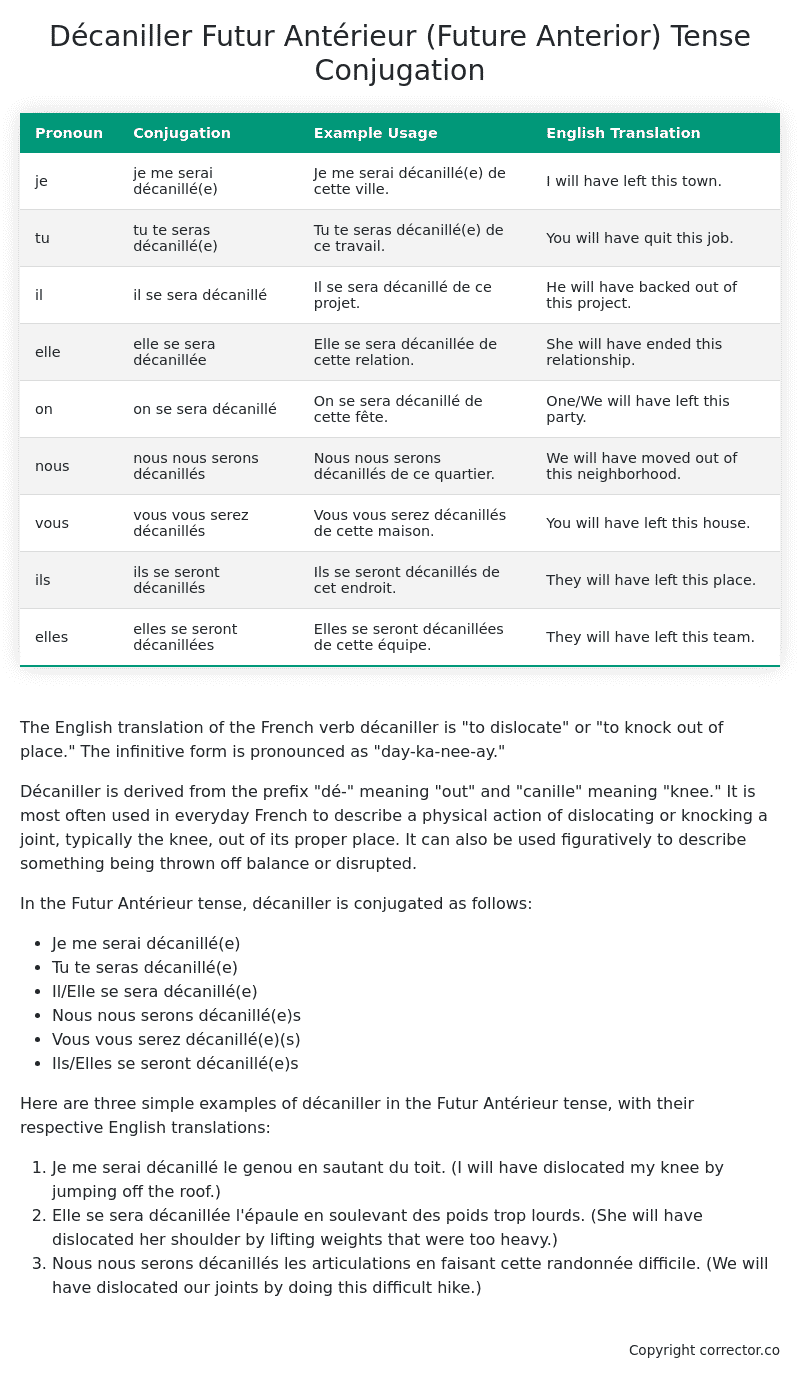Futur Antérieur (Future Anterior) Tense Conjugation of the French Verb décaniller
Introduction to the verb décaniller
The English translation of the French verb décaniller is “to dislocate” or “to knock out of place.” The infinitive form is pronounced as “day-ka-nee-ay.”
Décaniller is derived from the prefix “dé-” meaning “out” and “canille” meaning “knee.” It is most often used in everyday French to describe a physical action of dislocating or knocking a joint, typically the knee, out of its proper place. It can also be used figuratively to describe something being thrown off balance or disrupted.
In the Futur Antérieur tense, décaniller is conjugated as follows:
- Je me serai décanillé(e)
- Tu te seras décanillé(e)
- Il/Elle se sera décanillé(e)
- Nous nous serons décanillé(e)s
- Vous vous serez décanillé(e)(s)
- Ils/Elles se seront décanillé(e)s
Here are three simple examples of décaniller in the Futur Antérieur tense, with their respective English translations:
- Je me serai décanillé le genou en sautant du toit. (I will have dislocated my knee by jumping off the roof.)
- Elle se sera décanillée l’épaule en soulevant des poids trop lourds. (She will have dislocated her shoulder by lifting weights that were too heavy.)
- Nous nous serons décanillés les articulations en faisant cette randonnée difficile. (We will have dislocated our joints by doing this difficult hike.)
Table of the Futur Antérieur (Future Anterior) Tense Conjugation of décaniller
| Pronoun | Conjugation | Example Usage | English Translation |
|---|---|---|---|
| je | je me serai décanillé(e) | Je me serai décanillé(e) de cette ville. | I will have left this town. |
| tu | tu te seras décanillé(e) | Tu te seras décanillé(e) de ce travail. | You will have quit this job. |
| il | il se sera décanillé | Il se sera décanillé de ce projet. | He will have backed out of this project. |
| elle | elle se sera décanillée | Elle se sera décanillée de cette relation. | She will have ended this relationship. |
| on | on se sera décanillé | On se sera décanillé de cette fête. | One/We will have left this party. |
| nous | nous nous serons décanillés | Nous nous serons décanillés de ce quartier. | We will have moved out of this neighborhood. |
| vous | vous vous serez décanillés | Vous vous serez décanillés de cette maison. | You will have left this house. |
| ils | ils se seront décanillés | Ils se seront décanillés de cet endroit. | They will have left this place. |
| elles | elles se seront décanillées | Elles se seront décanillées de cette équipe. | They will have left this team. |
Other Conjugations for Décaniller.
Le Present (Present Tense) Conjugation of the French Verb décaniller
Imparfait (Imperfect) Tense Conjugation of the French Verb décaniller
Passé Simple (Simple Past) Tense Conjugation of the French Verb décaniller
Passé Composé (Present Perfect) Tense Conjugation of the French Verb décaniller
Futur Simple (Simple Future) Tense Conjugation of the French Verb décaniller
Futur Proche (Near Future) Tense Conjugation of the French Verb décaniller
Plus-que-parfait (Pluperfect) Tense Conjugation of the French Verb décaniller
Passé Antérieur (Past Anterior) Tense Conjugation of the French Verb décaniller
Futur Antérieur (Future Anterior) Tense Conjugation of the French Verb décaniller (this article)
Subjonctif Présent (Subjunctive Present) Tense Conjugation of the French Verb décaniller
Subjonctif Passé (Subjunctive Past) Tense Conjugation of the French Verb décaniller
Subjonctif Imparfait (Subjunctive Imperfect) Tense Conjugation of the French Verb décaniller
Subjonctif Plus-que-parfait (Subjunctive Pluperfect) Tense Conjugation of the French Verb décaniller
Conditionnel Présent (Conditional Present) Tense Conjugation of the French Verb décaniller
Conditionnel Passé (Conditional Past) Tense Conjugation of the French Verb décaniller
L’impératif Présent (Imperative Present) Tense Conjugation of the French Verb décaniller
L’infinitif Présent (Infinitive Present) Tense Conjugation of the French Verb décaniller
Struggling with French verbs or the language in general? Why not use our free French Grammar Checker – no registration required!
Get a FREE Download Study Sheet of this Conjugation 🔥
Simply right click the image below, click “save image” and get your free reference for the décaniller Futur Antérieur tense conjugation!

Décaniller – About the French Futur Antérieur (Future Anterior) Tense
Construction
Common Everyday Usage Patterns
Interactions with Other Tenses
For example
Summary
I hope you enjoyed this article on the verb décaniller. Still in a learning mood? Check out another TOTALLY random French verb conjugation!


